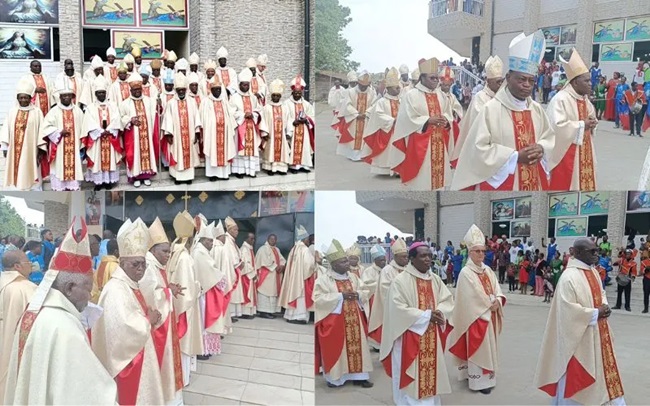Privacy Overview
This website uses cookies so that we can provide you with the best user experience possible. Cookie information is stored in your browser and performs functions such as recognising you when you return to our website and helping our team to understand which sections of the website you find most interesting and useful.


















2, April 2021
La Republique Du Cameroun: No country for young men 0
Tongues have been wagging in Yaoundé following the re-election of some ailing octogenarians to the helm of Cameroon’s two houses of Parliament last month.
Recent footage from the Upper House of Parliament showed 86-year-old Senator Marcel Niat Njifenji teetering to the podium on March 18. He was going to assume office following his re-election as president of the Senate, which he has headed since it went operational in 2013.
Earlier the same day, 81-year-old Hon Cavaye Yeguie Djibril retained his position as Speaker of the Lower House of Parliament, the National Assembly, a post he has held since 1992.
Hon Nafissatou Alim, the 30-year-old Member of Parliament of Mayo Louti constituency in the North region, and her colleague, Hon Dague Aicha Blanche Jacqueline of Mayo Kani South constituency in the Far North region of the country, were both just a year old when Hon Djibril was first elected Speaker.
The two youngest MPs of the current (10th) legislative period in Cameroon assisted the eldest member and head of the provisional bureau of the Lower House of Parliament, Hon Laurentine Nkoa Mfegue, CPDM MP for the Mefou and Afamba in the Centre region in the election of the Speaker which Hon Djibril contested unopposed.
Both Senator Niat and Hon Djibril, all members of the ruling CPDM party, were earlier approved for the jobs by party leader and Cameroon president, 88-year-old Paul Biya, who is also Africa’s oldest and second longest-serving leader.
In their inaugural speeches, delivered in very faint voices, the duo thanked Biya for appointing them to the positions.
Some had expected that Biya, who in February this year said “2021 is beginning on a positive note for our youth”, would propose younger people for the posts.
Though a lone candidate, Hon Djibril garnered 147 of the 162 valid votes cast, with 15 void ballots to retain his post as Speaker of the 180-member legislative institution, making him the longest-serving House Speaker in the country.
President Biya, Mr Njifenji and Mr Djibril are in order of state protocol, the first, second and third public personalities of the country. According to the Constitution, if President Biya is incapacitated, resigns or dies, the President of the Senate will take over power.
The re-election of the octogenarian men, however, did not come as a surprise to some MPs. Hon Koupit Adamou, a member of the opposition Cameroon Democratic Union (CDU), said he was not surprised with their re-election.
Old guards in power
“Looking at how our Parliament functions since independence, you realise that those who are elected at the beginning of a legislative period like this one are re-elected each year till the end of the mandate. So, anyone who thought anything will change is naive,” he said.
Another member of the Lower House of Parliament who did not take part in the election, said if he was present, he would have still voted for Hon Cavaye because he was the party’s candidate for the post.
“Party discipline is not only in Cameroon. It is all over the world,” the MP said, explaining he was on the field doing an assignment for the ruling party when the election took place.
However, the heads of the two houses of Parliament are not the only old guards in power in the Central African country.
The police boss, Martin Mbarga Nguele, is 89; head of National Hydrocarbons Company Adolphe Mudiki is 82; Justice Minister 78; Secretary General of ruling party 77; and Environment Minister 75, among others.
In Cameroon though, the World Bank says, the median age is 18.7 years and six in every 10 people you meet is aged below 35 years, the line that defines youth. Yet the country’s most powerful positions are held by frail, elderly men.
Ruled by ‘club of friends’
According to Prof Willibroad Dze-Ngwa, a Historian and Political Scientist at the University of Yaoundé, the country is ruled by “a club of friends who have been together for more than 50 years and just share power amongst themselves.”
Mr Dze-Ngwa reckons none of the old guards wants to leave the scene before the other, except if nature intervenes.
“You can see that such is reflected not only in the National Assembly and the Senate but at every level of public administration. Let me say that I have no particular bias against these so-called old people because they have been placed there by the young people,” he said.
The young people, Mr Dze-Nwa says, have not been doing enough politics or using their numbers and youthfulness to take over leadership of the country.
“Of course, when there is such a vacuum, the octogenarians as you call them take advantage and play politics. Remember politics is coining policies to gain power and govern. So if the octogenarians have been able to dominate politics, then they are succeeding in their game and staying on,” he says.
“That is why we are taking too much time to advance in democracy, that is why the old laws in the National Assembly and the Senate cannot be changed, that is why the electoral laws in Cameroon have remained virtually the same because we have the same people who have gained so much power and want to sustain that power,” Mr Dze-Ngwa adds.
Source: The East African